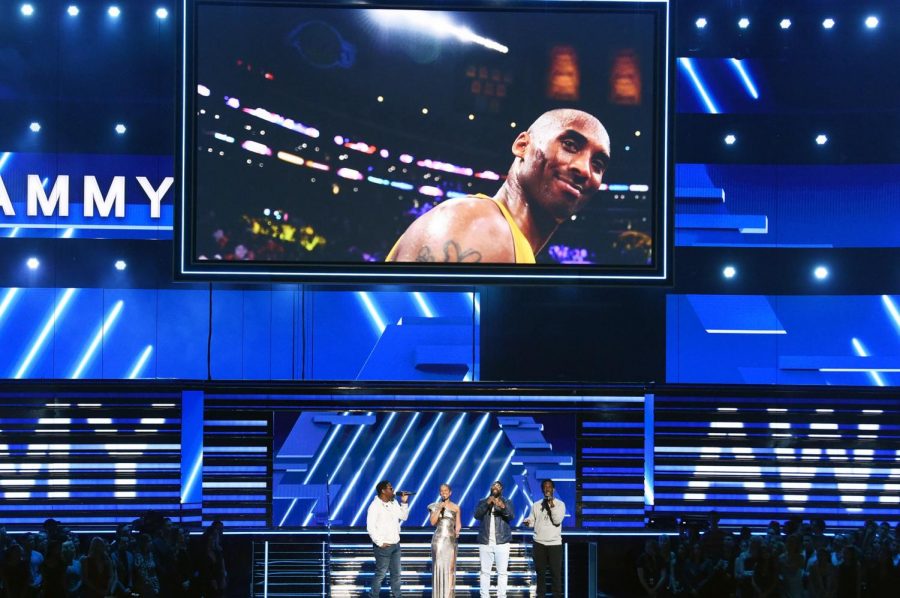The 2020 Grammy’s: A Tale of Two Worlds
Photo Credits: @RecordingAcademy, facebook.com
Alicia Keys and Boyz II Men began the night with a tear-jerking tribute to the late Kobe Bryant.
February 1, 2020
Marked by tragedy but awash with youthful creativity, the 2020 Grammy’s, which aired on Sunday, January 26th, were a time to celebrate the past while heralding the future. Standout performances from music’s elite defined the night, but controversy persisted behind the scenes, potentially jeopardizing the Recording Academy’s credibility.
Just hours before the Grammy’s main show kicked off, the world was shocked to learn that NBA legend Kobe Bryant, his daughter, and seven others passed away in a deadly helicopter crash. Staples Center, the building Bryant had called home for his entire career, was the venue that night, and host Alicia Keys did her best to commemorate Bryant–his retired jersey numbers hanging in the rafters were spotlighted throughout the opening monologue. Over the course of the night, performers like Lizzo and Lil Nas X paid tribute to the fallen great, highlighting the impact of his life.
Despite the unwelcome news, the spectacle that was music’s biggest night was not to be overshadowed, as nominees like Tyler, the Creator, Lizzo, and Lil Nas X performed their high-energy hits on customized sets akin to Broadway stages. Tyler, the Creator’s downright anarchic medley of “Earfquake” and “New Magic Wand” was universally acclaimed, with the Washington Post going as far as to say that “[he] did something magical on that stage.” Other standout performances included Lil Nas X’s star-studded rendition of “Old Town Road,” Gary Clark Jr. and the Roots’ fiery version of “This Land,” and Lizzo’s orchestral flute solo-interspersed “Truth Hurts,” among 14 others.
The actual awards portion of the night seemed to get lost in the shuffle of spectaculars, but Billie Eilish’s sweep of the top four categories did not go unnoticed. Coming from relative obscurity, Eilish’s debut full-length album, When We All Fall Asleep, Where Do We Go?, took home album of the year; its lead single, “Bad Guy,” took home song and record of the year, cementing her as the best new artist of the 2020 Grammy’s.
While some people who won awards were ecstatic, there were those who couldn’t help but feel conflicted over the actual value of the awards. According to Vulture, after accepting the award for best rap album (IGOR) and giving a joyous acceptance speech, Tyler, the Creator revealed backstage that “I’m half and half on [winning the award]… I mean guys that look like me — do anything that’s genre-blending, they always put it in a ‘rap’ or ‘urban’ category.”

For years, the Recording Academy has been under fire for practices which many deem backwards. Their dismissal of CEO Deborah Dugan has cast doubt on the legitimacy and integrity of the organization.
To add to Tyler, the Creator’s claim of racism in the Recording Academy, a report published by the Recording Academy Task Force on Diversity and Inclusion on December 12th, 2019 indicated that sexist and racist practices in the Academy were in desperate need of supervision and change. On page 31 of the manuscript, the Task Force identified multiple issues in the organization which served as “obstacles to underrepresented persons” in the music industry, stating that the Academy perpetuates the “Underrepresentation of women in the music industry, particularly within the industry’s technical fields,” and that it enforces a “Marginalization of certain ethnicities into particular roles or genres.”
Coming on the heels of the task force’s investigation was the ousting of Deborah Dugan, the Academy’s recently hired CEO. This occurred just 10 days before the airing of the awards show, and Dugan responded quickly with a host of allegations aimed at the organization’s “retaliation” and “voting irregularities,” according to TIME.
Dugan was hired following an image crisis in 2018 when the Grammy’s was flayed after a University of Southern California study revealed that just 9% of those nominated over the previous six awards shows were women, in a bid to help the Academy become more inclusive. However, when she came to blows with those deeply entrenched in the organization, she was quickly placed on leave by the organization.
She alleges that the Academy’s sudden reaction was caused by her attempts to expose its unethical practices, such as the true credibility of the voting system, which could be extremely hindered by biases and relationships with artists, according to TIME.
As the 2020 Grammy’s drew to a close, host Alicia Keys remarked that “We got a lot to change, we got a lot to do.” In a night filled with sadness for the death of an icon and the triumph of artists being recognized for exceptional work, the Dugan crisis was relatively silent, but it was always there, like a sleeping serpent. Inevitably, things will change at the Recording Academy between now and next year, but the question is if it will be for better or worse. Could we see the Grammy’s fazed out altogether? Time will tell, but one thing is certain: the Academy’s time to solve their problems is running short, and there is no shortage of problems clouding the horizon.



